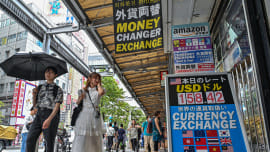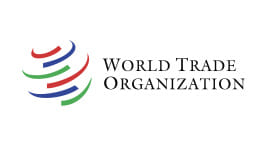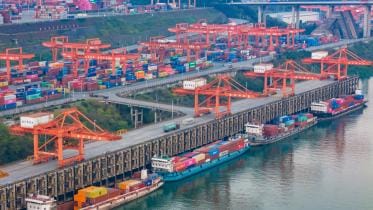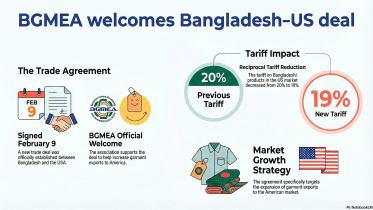Dollar holds gains in thin trading as markets await Fed minutes, US GDP
17 February 2026, 12:46 PM
Business
Oil in spotlight as Trump's Iran warning rattles sleepy markets
17 February 2026, 12:41 PM
Business
Thailand economic growth slows year-on-year: govt data
16 February 2026, 16:49 PM
Business
Japan's GDP falls short of expectations
16 February 2026, 16:37 PM
Business
India forced to defend US trade deal as doubts mount
16 February 2026, 12:12 PM
Business
ECB to extend euro backstop to boost currency's global role
15 February 2026, 12:14 PM
Business
The World Trade Organization is on life support. Will Trump’s new rules finish it off?
14 February 2026, 14:18 PM
Business
WTO chief urges China to shift on trade surplus
14 February 2026, 13:51 PM
Business
US consumer inflation eases more than expected to lowest since May
14 February 2026, 12:38 PM
Business
US waives Venezuela oil sanctions as Trump says expects to visit
14 February 2026, 12:35 PM
Business
Dollar holds gains in thin trading as markets await Fed minutes, US GDP
The dollar index , which measures the greenback against a basket of currencies, inched up to 97.12 after a 0.2 percent gain in the previous session
17 February 2026, 12:46 PM
Oil in spotlight as Trump's Iran warning rattles sleepy markets
West Texas Intermediate was up more than one percent, nearing $64 per barrel
17 February 2026, 12:41 PM
Thailand economic growth slows year-on-year: govt data
Exports rose 11.9 percent compared to 4.4 percent in 2024, despite global uncertainty amid a slew of US tariff announcements last year
16 February 2026, 16:49 PM
Japan's GDP falls short of expectations
GDP in the world's fourth-biggest economy expanded by just 0.1 percent in the fourth quarter
16 February 2026, 16:37 PM
India forced to defend US trade deal as doubts mount
The deal announced this month has rattled India's powerful farmers' unions
16 February 2026, 12:12 PM
ECB to extend euro backstop to boost currency's global role
The new facility will extend this to central banks worldwide, as long as they fulfil certain criteria
15 February 2026, 12:14 PM
The World Trade Organization is on life support. Will Trump’s new rules finish it off?
Largely designed to serve its strategic and corporate interests, the US now sees the WTO as a liability
14 February 2026, 14:18 PM
WTO chief urges China to shift on trade surplus
China's trade surplus hit a record $1.2 trillion last year
14 February 2026, 13:51 PM
US consumer inflation eases more than expected to lowest since May
The consumer price index (CPI) rose 2.4 percent year-on-year
14 February 2026, 12:38 PM
US waives Venezuela oil sanctions as Trump says expects to visit
The oil industry has expressed interest in the petroleum-rich country, while cautioning that the timeframe for investment depended on having clear rules after expropriations by earlier governments
14 February 2026, 12:35 PM
Google turns to century-long debt to build AI
The Silicon Valley internet giant reportedly aims to raise about $20 billion overall, a chunk of it by issuing bonds that mature in February of 2126
11 February 2026, 13:45 PM
US retail sales flat in December as consumers pull back
Overall sales were flat on a month-on-month basis at $735 billion
11 February 2026, 12:22 PM
BGMEA welcomes Bangladesh-US trade deal
The association will convene an urgent meeting to determine the next course of action regarding the deal
10 February 2026, 19:19 PM
Oil drifts lower as traders weigh supply risks amid US–Iran tensions
Brent crude oil futures were down 18 cents, or 0.26 percent, at $68.85 a barrel by 0353 GMT
10 February 2026, 11:51 AM
US to lower tariff for Bangladesh from 20% to 19%
The two countries signed a deal moments ago
9 February 2026, 22:53 PM
Forex reserves cross $29 billion this month as per IMF method
It hit $29.47 billion today
9 February 2026, 20:34 PM
Taiwan says 'impossible' to move 40 percent chip capacity to US
Taiwan is a powerhouse in producing chips -- a critical component in the global economy
9 February 2026, 12:41 PM
Gold, silver extend gains on softer dollar
Spot gold rose 1.1 percent to $5,012.76 per ounce by 0502 GMT
9 February 2026, 12:00 PM
Indian refiners avoid Russian oil in push for US trade deal
Indian Oil, Bharat Petroleum and Reliance Industries are not accepting offers from traders for Russian oil loading in March and April
8 February 2026, 14:48 PM
US consumer sentiment rises to six-month high in early Februaryv
The third straight monthly improvement in sentiment reported by the University of Michigan's Surveys of Consumers on FridayThe third straight monthly improvement in sentiment reported by the University of Michigan's Surveys of Consumers on Friday
8 February 2026, 12:54 PM






























